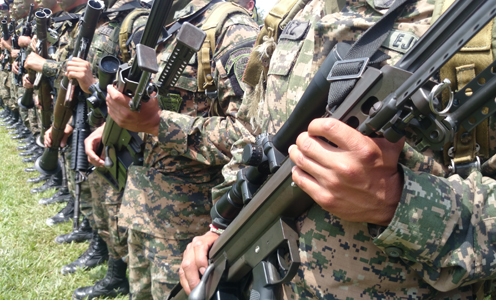The original version of this article was written by Jaime López, Mauricio Caceres, Luis Alberto López, Mario Beltran, Ross Mary Zepeda and Tatiana Alemán and was published on the website Connectas in May 2014. Below is the first of a two-part series.

Officers from the Salvadorean military. Photo courtesy the authors.
El Salvador seems to be replicating that mythical ploy of war known as the Trojan Horse. In Homer's poem “The Odyssey”, he tells the story of how the Greek Odysseus fakes the retreat of his army and leaves a wooden horse filled with soldiers at the door of the walls of Troy. The Trojans naively accept the offering, and when they bring in the huge gift, the Greek soldiers come out and destroy the city.
In El Salvador, feared gangs are assuming the role of the Greek soldiers.
Here, there is no underlying love story as there was in the Greek story. In El Salvador, it’s about infiltrating the country's security forces to steal weapons, as the Minister of Defense David Munguía Payés says.
It also demonstrates the evolution of these groups, which want more power in order to influence the investigations against them and obtain key information in the fight against crime, to the extent that their criminal activities are becoming more lucrative, says criminologist Carlos Ponce, former adviser to the National Civil Police (PNC) and the Attorney General’s Office (FGR).
In the past five years, according to a source in the Public Information Access Unit of the Ministry of National Defense, 91 people with ties to gangs were identified, including active members and a couple of administrative personnel. Of these, 49 were related to the gang Pandilla 18 and the rest to Salvatrucha. During the same period, 29 people were expelled from the National Public Security Academy (ANSP) after having been proven to have gang ties. In this case, 16 were related to Salvatrucha.
While it’s true that percentage-wise, it wouldn’t seem that the suspended cases would mean much among the more than 10,000 members of security forces who arrived at these institutions at the same time, a hundred infiltrators detected is clearly a sufficient warning for institutions to keep watch to guarantee Salvadorans’ peace of mind.
Identifying the infiltrators is not an easy task. On one hand, there is a difference between those who have some type of link to gangs and those who are actual members. On the other hand, both institutions must have proper safeguards in place and be forceful in exposing these relationships and their impact. Presumably, an insufficient process would come back to haunt the state, resulting in millions in lawsuits.
In the case of the ANSP, according to its Director Jaime Martínez, “In no instance has it been demonstrated that a student of the academy is directly involved in a gang”, and the expelled persons’ links were shown to be untrustworthy.
As far as the army, judging by the report from the Public Information Access Unit, cases have been identified in which those implicated have been found doing traditional graffiti alluding to gangs.
In other cases, suspicions can be aroused by the way members express themselves and the use of gestures typical of these criminal groups, according to what is explained in the institution. According to sources at the State Investigation Agency (OIE), the fact that gang members have stopped tattooing, or tattoo in less visible places compared to previous generations, has allowed them to stay under the radar of the authorities.
Investigator Gema Santamaría of the Transnational Network of Gang Analysis agrees with the OIE and adds that this phenomenon has been evident since the early 2000s, when the Salvadoran authorities began to implement “Mano Dura” (Heavy Hand) and “Super Mano Dura” (Extra Heavy Hand) policies. “Given that these policies made the use of tattoos the main mechanism by which gang members were identified, and given that merely belonging to these groups was criminalized, the gang members adopted strategies to hide their membership in the group and the gangs acquired a more and more clandestine and elusive character,” says Santamaría.
According to military sources, there are cases where gang members have even threatened military members into collaborating with them. Either by corruption or coercion, several have access to obtain high-caliber weapons from their respective institutions, as revealed by the defense minister, according to their research. For every explosive obtained, the criminals pay $400 to $500, and between $800 to $1,200 per rifle, explained Munguía at the time.
One example of the reach of this arms trafficking is the case discovered by authorities in Chalatenango (in northern El Salvador, on the border with Honduras) where they found four AK-47s, a G-3 rifle, an M-79 grenade launcher, an Uzi submachine gun and a shotgun. The arsenal was buried in a barrel on the outskirts of that town, ready to be delivered to the interested party.
In another case, reported by the Attorney General's Office, 213 M90 anti-tank grenades were recovered late last year. According to the public prosecutor, these artifacts were from an army lot that should have been destroyed but the order was not carried out, in order to sell them later. Those responsible have not yet been identified, but it is clear that the weapons will benefit gang crime, and the crime could only be accomplished through infiltrators.







7 comments